Unit 2 My Favourite School Subject Lesson 9-16[上学期]
文档属性
| 名称 | Unit 2 My Favourite School Subject Lesson 9-16[上学期] | 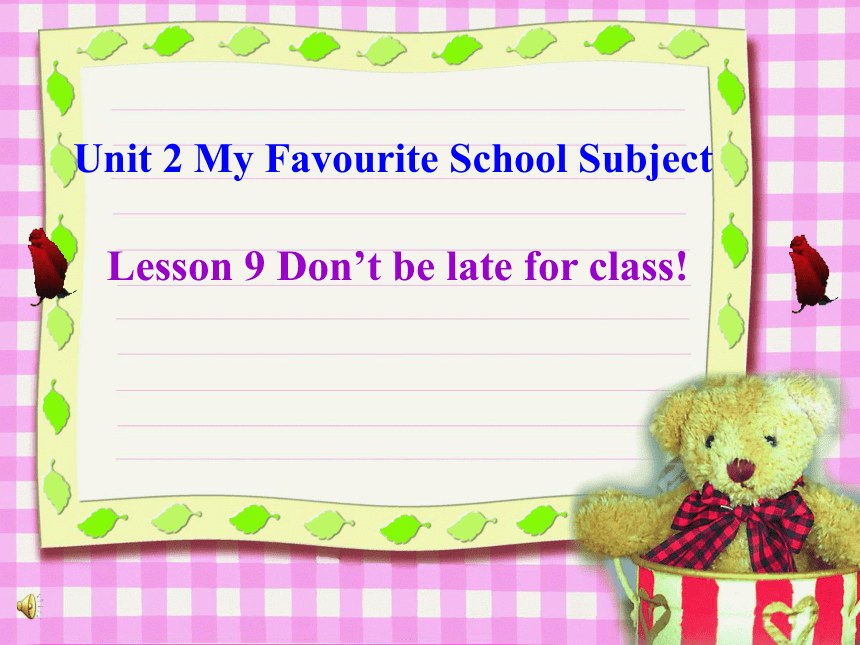 | |
| 格式 | rar | ||
| 文件大小 | 3.4MB | ||
| 资源类型 | 教案 | ||
| 版本资源 | 冀教版 | ||
| 科目 | 英语 | ||
| 更新时间 | 2006-10-27 18:32:00 | ||
图片预览


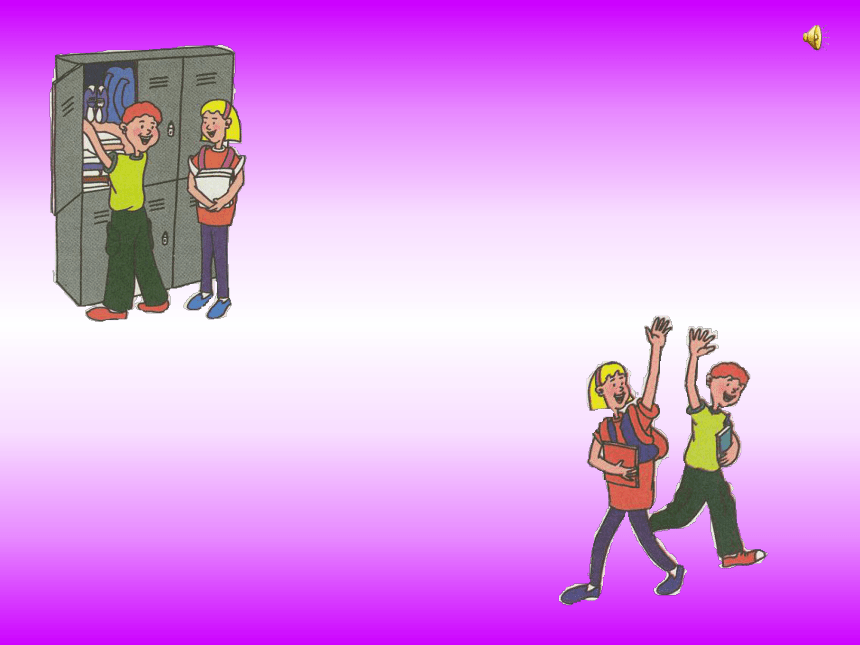
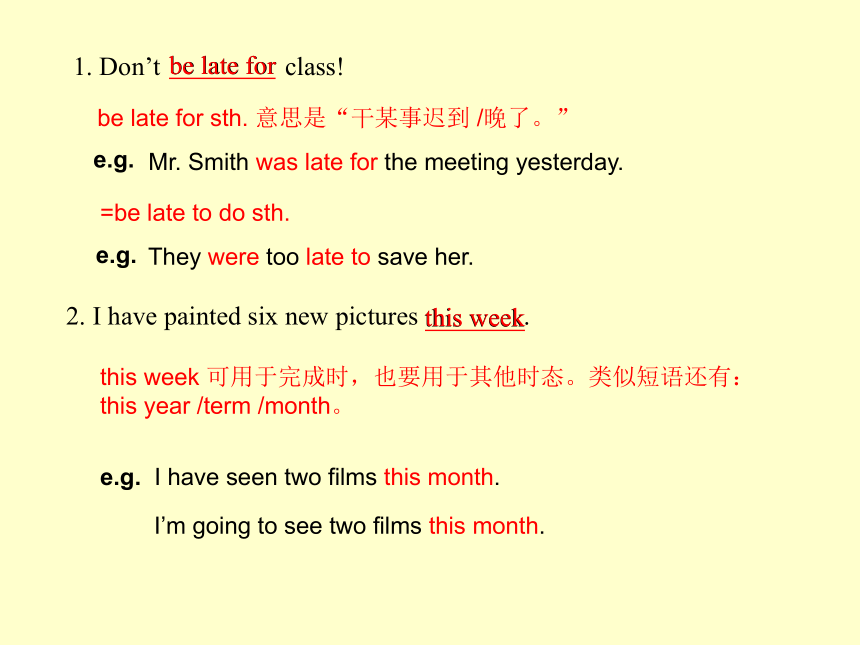
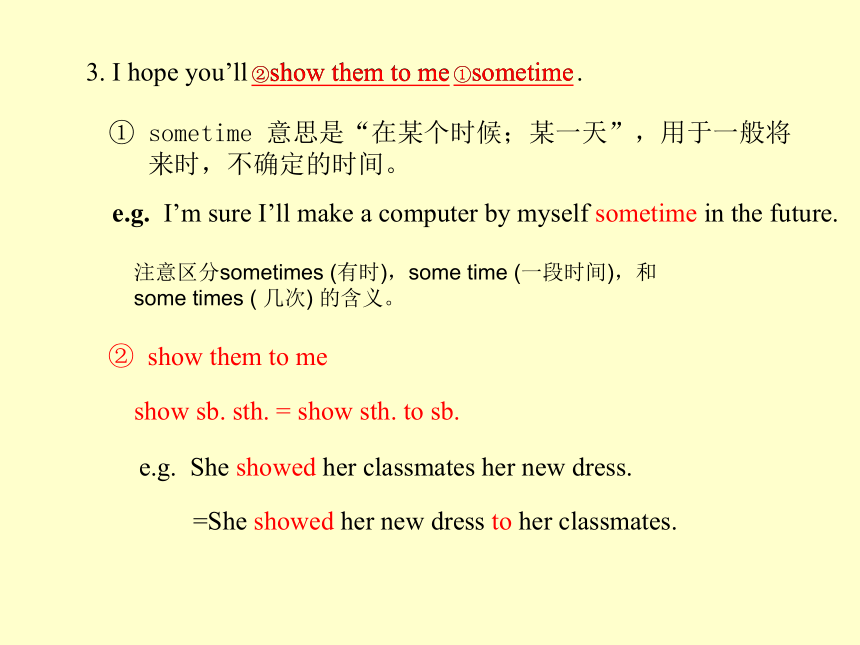

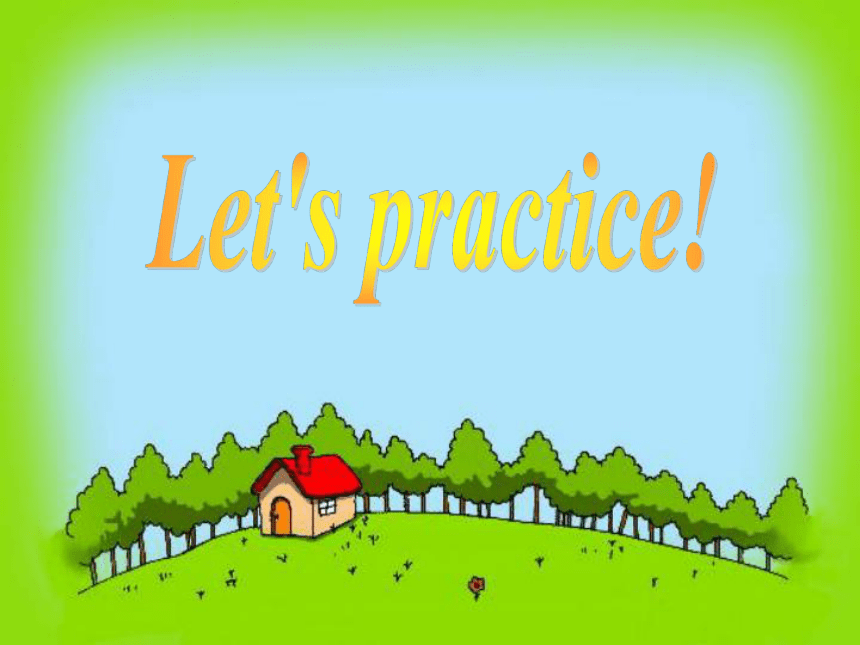
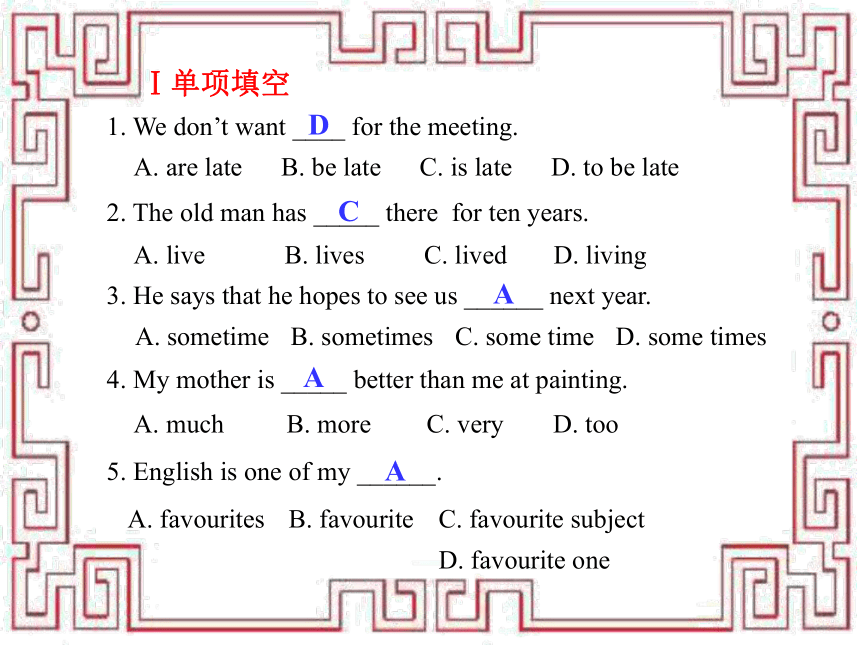
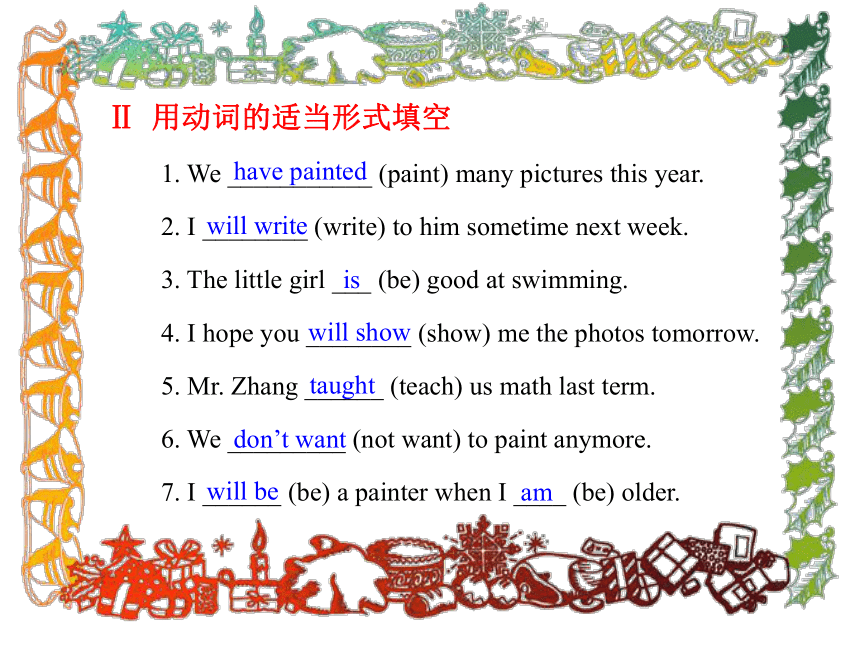

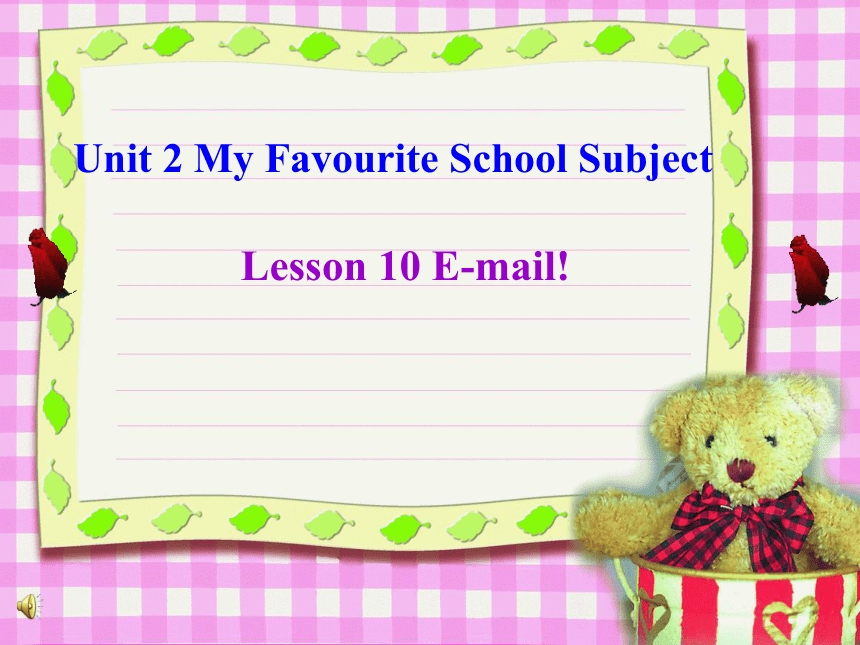
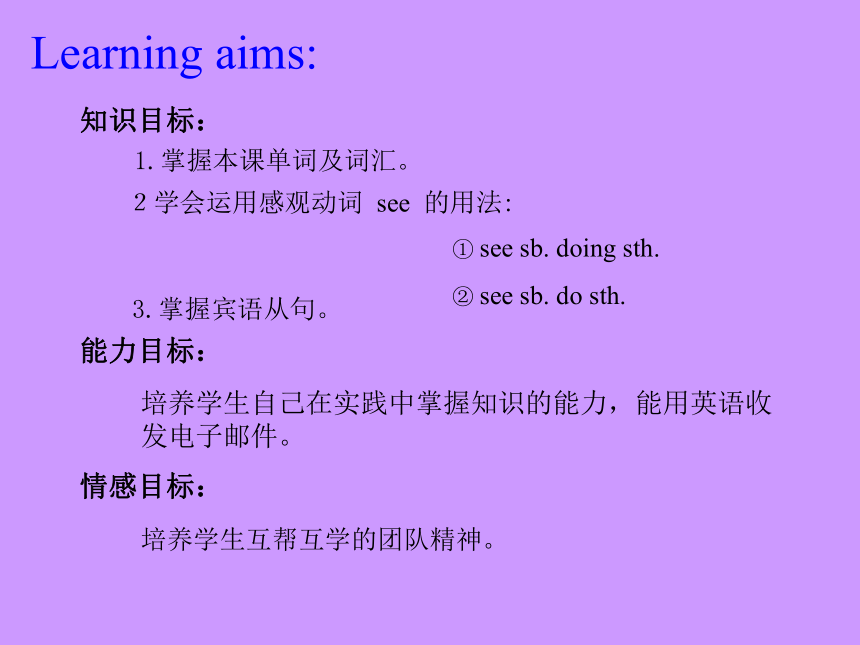
文档简介
课件51张PPT。Unit 2 My Favourite School SubjectLesson 9 Don’t be late for class!Learning aims:知识目标:1.掌握本课单词及词汇。2.学会运用本课句型。能力目标:(1) subject, art, hope, show, sometime, start /begin(2) be good at = do well in 1.掌握现在完成时。2.学会用英语表达出自己的爱好特长以及进行简短交际。情感目标:培养各种爱好,明确学习态度。(3) be late for1. Don’t class!be late forbe late forbe late for sth. 意思是“干某事迟到 /晚了。”=be late to do sth. e.g.Mr. Smith was late for the meeting yesterday.e.g.They were too late to save her.2. I have painted six new pictures .this weekthis weekthis week 可用于完成时,也要用于其他时态。类似短语还有:this year /term /month。e.g. I have seen two films this month. I’m going to see two films this month.3. I hope you’ll .①sometime①sometime① sometime 意思是“在某个时候;某一天”,用于一般将
来时,不确定的时间。e.g. I’m sure I’ll make a computer by myself sometime in the future.注意区分sometimes (有时),some time (一段时间),和some times ( 几次) 的含义。②show them to me②show them to me② show them to meshow sb. sth. = show sth. to sb.e.g. She showed her classmates her new dress.=She showed her new dress to her classmates.4. I art this year.am much better atam much better at固定短语 be good at 意为”擅长“,而 be better at 是 be good at 的比较级,意为“更擅长”。此句中 better 前放much,用来加强语气和程度。e.g. She is good at English. I’m much better at English than her.5. ① class 用作集合名词,表示“课”,作主语时,谓语动词可用作单
数。② start 与 begin 同义。 ③ in 后面加上一段时间表示一段时间以后,常用于一般将来时。e.g. We’ll hold the 2008 Olympic Games in three years.①Class②starts③in two minutes.①Class②starts③in two minutes.Let's practice!Ⅰ单项填空1. We don’t want ____ for the meeting.A. are lateB. be lateC. is lateD. to be late2. The old man has _____ there for ten years.A. live B. lives C. lived D. living3. He says that he hopes to see us ______ next year.A. sometimeB. sometimesC. some timeD. some times4. My mother is _____ better than me at painting.A. much B. more C. very D. too5. English is one of my ______.A. favourites B. favouriteC. favourite subjectD. favourite oneDCAAAⅡ 用动词的适当形式填空1. We ___________ (paint) many pictures this year.2. I ________ (write) to him sometime next week.3. The little girl ___ (be) good at swimming.4. I hope you ________ (show) me the photos tomorrow.5. Mr. Zhang ______ (teach) us math last term.6. We _________ (not want) to paint anymore.7. I ______ (be) a painter when I ____ (be) older.have paintedwill writeiswill showtaughtdon’t wantwill beam 展示自己的绘画作品、手工艺品或其他作品,并用英语来表达自己的爱好及特长。Homework:Unit 2 My Favourite School SubjectLesson 10 E-mail!Learning aims:知识目标:1.掌握本课单词及词汇。2学会运用感观动词 see 的用法:能力目标:培养学生自己在实践中掌握知识的能力,能用英语收发电子邮件。情感目标:培养学生互帮互学的团队精神。① see sb. doing sth. 3.掌握宾语从句。② see sb. do sth.Listen and answer:(Listen to the tape and answer the questions.)1. Do you think you have too much homework?2. What subject does Danny like best?Hi, Li Ming,
I have a lot of homework this year! All our teachers make us study very hard. My head is always tired. Some of my classes are a lot of fun. My favourite class is physical education.
Yesterday in P.E., I put Brian’s shorts on my head and his runners on my hands. Everyone laughed, except the teacher. He said that it wasn’t funny, but I saw him smile!
Time for supper! Write to me soon!
Danny “P.E.” is short for “physical education.” P.E. is about sports. I love sports!Dear Danny,
I have written three English e-mails today. Our English teacher has told us that the best way to learn English is to use it. So you have helped me to learn English!
Ms. Liu gives us lots of interesting projects in English class. This week we are talking about our favourite subjects in school. I like English best. I also like mathematics. My friend Wang Mei is very good at math. She has helped me with my math homework. We have a math exam on Friday. We are going to study together tonight.
Your friend,
Li Ming“Exam” is short for “examination.” What’s an exam? It’s a big quiz.except 是介词, 意思是“除……之外”,但不包括except 之后的内容,其后可接名词,代词。1. All our teacher very, very hard.make us studymake us studymake sb. do sth. “使某人做某事”。e.g. My parents make me work hard. make sb. + adj.e.g. This story makes us sad.2. Everyone laughed, the teacher.exceptexcept4. You have English.helped me to learnhelped me to learnhelp 常用于句型:help sb. (to) do sth. 和 help sb. with sth.e.g. She often helps her mother do the housework. She often helps her mother with the housework.3. Our English teacher has told us the best way
is . that 引导的是一个宾语从句;动词不定式 to learn English 作
the best way 的定语; to use it 作表语。 e.g. My job is look after the old man.thatthatto learn Englishto learn English to use itto use it 假如你是林红(linhong@163. com),给你的朋友韩霞(hanxia@163.com)发一封电子邮件,给她一些学好某一学科的建议。Unit 2 My Favourite School SubjectLesson 11 What’s your favourite subject?Learning aims:知识目标:1.学会本课单词。能力目标:用英语谈论自己所喜欢的科目、表达自己的想法以及说出自己喜欢或不喜欢的原因。情感目标:在交谈中相互了解、相互帮助,共同完成本课的学习任务。2.掌握本课句型。New words :hallnoongroupsocialsocial studieseverythingcoolstopturn outo’clock1. My subject is English.favourite 形容词,用于修饰名词,意为“最喜爱的”。e.g. Danny’s favourite subject is English. 2. Turn out the light.turn the light out = turn out the light /turn it outturn out = turn off turn on (反)e.g. Please turn out the TV, my baby is sleeping.3. We should .stop + doing sth. 表示“停止正在做的事情”。stop to do sth. 表示“停下来去做某事”。e.g. Danny stopped flying a kite. ( 丹尼不放风筝了。) Danny stopped to fly a kite. ( 丹尼停下来,开始放风筝。) favourite favouritestop talkingstop talking用所给词的适当形式填空1. How many __________ (country) are there in the world?2. Jenny loves _________ (learn) all the subjects.5. Let’s _____ (meet) outside the gym.4. It is ______ (sun) today, but a little cold.3. English is my ______ (one) class every Tuesday.6. I don’t want ______ (be) late for class.countrieslearningfirstsunnymeetto beHomework:Show us your favourite subject. Then talk about in the class.Unit 2 My Favourite School SubjectLesson 12 Tick-tock Learning aims:知识目标:1.学会本课单词。能力目标:能用英语熟练地说出时间,掌握时间表达法。情感目标:2.掌握本课句型。通过演唱歌曲,进一步激发学生们学习英语的兴趣。What time is it?It’s…nine o’clock nine ten /ten past ninenine thirty /a half past ninenine forty-five /a quarter to tennine forty /twenty to tennine o’clock nine ten /ten past ninenine fifteen /a quarter past ninenine fifteen /a quarter past ninenine thirty /a half past ninenine forty-five /a quarter to tennine forty /twenty to ten(clap clap)
See the time?(clap clap)
On the clock.(clap clap)
Time for lunch?(clap clap)
No, not yet!(clap clap)
Oh? Then when?(clap clap)
Half an hour.(clap clap)
What time will that be?(clap clap)
Quarter to three.(snap snap)
TICK-TOCK!(snap snap)
TICK-TOCK!(snap snap)
TICK-TOCK!(snap snap)
TICK-TOCK!(snap snap)
TICK-TOCK!(snap snap)
TICK-TOCK!(snap snap)
TICK-TOCK!(snap snap)
TICK-TOCK!What does this clock say? It says “a quarter to three.” What’s the time?
It’s a quarter past three.Now it’s three thirty. You can also say “half past three.”时刻表达法(1) 用基数词,点钟在前,分钟在后。例如:7:00 seven o’clock 或 seven8:40 eight forty(2) 当分钟不超过30分钟,用past 或 after 表示,意思是“‥‥‥点超过‥‥‥分”;当分钟超过30分钟时,用 to ,意思是“差‥‥‥分到‥‥‥点”,分钟在前,点钟在后。例如: 1:20 twenty past one4:50 ten to five 另外,30分钟可用 half ,一刻钟可用(a) quarter 表示。例如:6:30 half past six7:45 a quarter to eight根据汉语提示完成句子1. My teacher doesn’t want me ___ ___ ____. (迟到)2. That’s a ______ (可笑的) thing.3. It’s a _______ ____ ______ (差一刻十一点). Let’s go to bed.4. It’s ____ _____ _____ (该吃午饭了).5. I ____ _______ (高兴) when I saw my parents.funnyquarter to eleven time for lunch was happyUnit 2 My Favourite School SubjectLesson 13 Looking for LisaLearning aims:知识目标:1.学会本课单词。能力目标:能熟练运用各种时态,并掌握各种时态之间的转换。情感目标:2.复习巩固一般现在时、一般过去时、现在完成时、一般将来时。开拓学生视野,培养各种爱好以及对待学习的科学态度。Read the text quickly with the question (5 minutes):What mistake does Danny make in the library?He makes a lot of noise.1. Jenny and Bill meet at three o’clock to their project.work on 意为 “从事于……”。
e.g.The girl is working on a new book.work out “算出,解决”work up “改进,提高”work onwork on2. Here are pictures of Beijing.some moresome moresome more 意为 “更多一些,再来一些”, 既可修饰可数名词又可修饰不可数名词。e.g. Would you like some more bananas? I’m still thirsty. I want some more water.3. It would be fun to study about China. (过去将来时) would + do 多用于过去的某一时间看将来要发生的动作或
存在的状态。(2) was /were + going to +doe.g. I wasn’t sure whether he would do it. I didn’t know if she was going to come.4. maybe 和 may be的区别。 (1) maybe 意为 “或许,大概,也许”。 e.g. Maybe it will rain tomorrow.(2) may be 则是情态动词 may + 动词原形,意为 “也许”,
表示可能性。 e.g. My brother may be at home. Maybe my brother is at home.After class, go into the library to read and borrow some useful books.Homework:Unit 2 My Favourite School SubjectLesson 14 Irfan studied China! Learning aims:知识目标:1. Words and expressions.能力目标:能用英语表达一些科普、科学探索和动物世界等简短片段。情感目标:2. Present Perfect Tense. (现在完成时)通过对北京的进一步了解,加深对我们祖国的热爱。interestingtravelfestivalChildren’s DayMother’s DayFather’s DayPeking (Beijing)IrfanNew words:Knowledge points:1. You different countries of the world.learn aboutlearn aboutlearn about 意为 “(通过某种途径) 得知,获知 (有关的信息)”。e.g. I didn’t learn about that until my friend told me. learn from + sb.e.g. Li Ming learns English from Jenny.2. That’s a funny name, isn’t it? 反意疑问句,由前后两部分组成。前面是肯定形式时,后面的问句通常是否定形式;反之,前面是否定形式时,后面的问句通常是肯定形式。但要注意前后部分时态一致,译成汉语时,要依据实际意思和汉语表达习惯。— You aren’t a student, are you? 你不是一个学生,是吗?— No, I’m not. 是的,我不是。— Yes, I am. 不,我是。Unit 2 My Favourite School SubjectLesson 15 Karen’s hair stood up! Date: September 25
Weather: Windy and cool
Dear diary,
Today we gave our talks to the class about our favourite subjects.
My group talked about our favourite subject—art. We each brought a painting we made in our art class. Mine was a picture of the ocean. I painted birds, a boat, clouds and the sun. Last summer in England my family went to the ocean. The picture always makes me remember my holiday.
Jenny and Bill were next. Their favourite subject is social studies. Bill showed us lots of photographs of Beijing. It looks like a very big city! Jenny played some Chinese music. She also read some letters and e-mails from her friend in China, Li Ming.
Karen and jack showed us some physics. Jack put some very small tea leaves on the desk. Then Karen combed her hair ten times very quickly. She has long hair! She put the comb beside the tea leaves. The leaves jumped to the comb! She could also make her hair stand up with the comb. Everyone was very surprised.
Finally, Danny and Lisa gave their talk. We went to the gym. Danny played basketball. Lisa showed us some exercises.
Time for bed!1. Today we to the class about our favourite subjects.give a talk 意为 “作演讲,作报告” = give a speechhave a talk /listen a talk 意为 “听报告”2. We brought a painting we made in art class.(1) each 代词,句中作同位语。
e.g. They each are different opinions about it.(2) each 句中作主语,each of + 代词 /名词的复数形式。
e.g. Each of the women wore her best dress.(3) each 形容词,句中作定语,意为 “每个的”。
e.g. There is a bookstore on each side of the street.(4) each 副词,意为 “每个地”。
e.g. My aunt gave us 10 dollars each.gave our talksgave our talkseacheach 3. Then Karen combed her hair ten quickly.times 意为 “次数”
e.g. How many times did you see the movie?4. finally 意为 “最后”
finally = at last = in the end timestimesUnit 2 My Favourite School SubjectLesson 16 Unit ReviewⅠ 词汇subject, hope, show, sometime, be good at, painter, start, hurry, late, study, except, smile, exam, group, stop, turn, out /on /down /up, half an hour, quarter, library, carry, noise, office, maybe, interesting, travel, festivalⅡ 重难点1. be good at, be late for 的用法。2. 感观动词的用法。3. 时间表达法。4. 理解 past 和 to 在时间表达法中的含义。5. 掌握各种时态之间的转换。6. interest, interesting 及 interested 的用法。7. each, give, a talk 的用法。Goodbye!
来时,不确定的时间。e.g. I’m sure I’ll make a computer by myself sometime in the future.注意区分sometimes (有时),some time (一段时间),和some times ( 几次) 的含义。②show them to me②show them to me② show them to meshow sb. sth. = show sth. to sb.e.g. She showed her classmates her new dress.=She showed her new dress to her classmates.4. I art this year.am much better atam much better at固定短语 be good at 意为”擅长“,而 be better at 是 be good at 的比较级,意为“更擅长”。此句中 better 前放much,用来加强语气和程度。e.g. She is good at English. I’m much better at English than her.5. ① class 用作集合名词,表示“课”,作主语时,谓语动词可用作单
数。② start 与 begin 同义。 ③ in 后面加上一段时间表示一段时间以后,常用于一般将来时。e.g. We’ll hold the 2008 Olympic Games in three years.①Class②starts③in two minutes.①Class②starts③in two minutes.Let's practice!Ⅰ单项填空1. We don’t want ____ for the meeting.A. are lateB. be lateC. is lateD. to be late2. The old man has _____ there for ten years.A. live B. lives C. lived D. living3. He says that he hopes to see us ______ next year.A. sometimeB. sometimesC. some timeD. some times4. My mother is _____ better than me at painting.A. much B. more C. very D. too5. English is one of my ______.A. favourites B. favouriteC. favourite subjectD. favourite oneDCAAAⅡ 用动词的适当形式填空1. We ___________ (paint) many pictures this year.2. I ________ (write) to him sometime next week.3. The little girl ___ (be) good at swimming.4. I hope you ________ (show) me the photos tomorrow.5. Mr. Zhang ______ (teach) us math last term.6. We _________ (not want) to paint anymore.7. I ______ (be) a painter when I ____ (be) older.have paintedwill writeiswill showtaughtdon’t wantwill beam 展示自己的绘画作品、手工艺品或其他作品,并用英语来表达自己的爱好及特长。Homework:Unit 2 My Favourite School SubjectLesson 10 E-mail!Learning aims:知识目标:1.掌握本课单词及词汇。2学会运用感观动词 see 的用法:能力目标:培养学生自己在实践中掌握知识的能力,能用英语收发电子邮件。情感目标:培养学生互帮互学的团队精神。① see sb. doing sth. 3.掌握宾语从句。② see sb. do sth.Listen and answer:(Listen to the tape and answer the questions.)1. Do you think you have too much homework?2. What subject does Danny like best?Hi, Li Ming,
I have a lot of homework this year! All our teachers make us study very hard. My head is always tired. Some of my classes are a lot of fun. My favourite class is physical education.
Yesterday in P.E., I put Brian’s shorts on my head and his runners on my hands. Everyone laughed, except the teacher. He said that it wasn’t funny, but I saw him smile!
Time for supper! Write to me soon!
Danny “P.E.” is short for “physical education.” P.E. is about sports. I love sports!Dear Danny,
I have written three English e-mails today. Our English teacher has told us that the best way to learn English is to use it. So you have helped me to learn English!
Ms. Liu gives us lots of interesting projects in English class. This week we are talking about our favourite subjects in school. I like English best. I also like mathematics. My friend Wang Mei is very good at math. She has helped me with my math homework. We have a math exam on Friday. We are going to study together tonight.
Your friend,
Li Ming“Exam” is short for “examination.” What’s an exam? It’s a big quiz.except 是介词, 意思是“除……之外”,但不包括except 之后的内容,其后可接名词,代词。1. All our teacher very, very hard.make us studymake us studymake sb. do sth. “使某人做某事”。e.g. My parents make me work hard. make sb. + adj.e.g. This story makes us sad.2. Everyone laughed, the teacher.exceptexcept4. You have English.helped me to learnhelped me to learnhelp 常用于句型:help sb. (to) do sth. 和 help sb. with sth.e.g. She often helps her mother do the housework. She often helps her mother with the housework.3. Our English teacher has told us the best way
is . that 引导的是一个宾语从句;动词不定式 to learn English 作
the best way 的定语; to use it 作表语。 e.g. My job is look after the old man.thatthatto learn Englishto learn English to use itto use it 假如你是林红(linhong@163. com),给你的朋友韩霞(hanxia@163.com)发一封电子邮件,给她一些学好某一学科的建议。Unit 2 My Favourite School SubjectLesson 11 What’s your favourite subject?Learning aims:知识目标:1.学会本课单词。能力目标:用英语谈论自己所喜欢的科目、表达自己的想法以及说出自己喜欢或不喜欢的原因。情感目标:在交谈中相互了解、相互帮助,共同完成本课的学习任务。2.掌握本课句型。New words :hallnoongroupsocialsocial studieseverythingcoolstopturn outo’clock1. My subject is English.favourite 形容词,用于修饰名词,意为“最喜爱的”。e.g. Danny’s favourite subject is English. 2. Turn out the light.turn the light out = turn out the light /turn it outturn out = turn off turn on (反)e.g. Please turn out the TV, my baby is sleeping.3. We should .stop + doing sth. 表示“停止正在做的事情”。stop to do sth. 表示“停下来去做某事”。e.g. Danny stopped flying a kite. ( 丹尼不放风筝了。) Danny stopped to fly a kite. ( 丹尼停下来,开始放风筝。) favourite favouritestop talkingstop talking用所给词的适当形式填空1. How many __________ (country) are there in the world?2. Jenny loves _________ (learn) all the subjects.5. Let’s _____ (meet) outside the gym.4. It is ______ (sun) today, but a little cold.3. English is my ______ (one) class every Tuesday.6. I don’t want ______ (be) late for class.countrieslearningfirstsunnymeetto beHomework:Show us your favourite subject. Then talk about in the class.Unit 2 My Favourite School SubjectLesson 12 Tick-tock Learning aims:知识目标:1.学会本课单词。能力目标:能用英语熟练地说出时间,掌握时间表达法。情感目标:2.掌握本课句型。通过演唱歌曲,进一步激发学生们学习英语的兴趣。What time is it?It’s…nine o’clock nine ten /ten past ninenine thirty /a half past ninenine forty-five /a quarter to tennine forty /twenty to tennine o’clock nine ten /ten past ninenine fifteen /a quarter past ninenine fifteen /a quarter past ninenine thirty /a half past ninenine forty-five /a quarter to tennine forty /twenty to ten(clap clap)
See the time?(clap clap)
On the clock.(clap clap)
Time for lunch?(clap clap)
No, not yet!(clap clap)
Oh? Then when?(clap clap)
Half an hour.(clap clap)
What time will that be?(clap clap)
Quarter to three.(snap snap)
TICK-TOCK!(snap snap)
TICK-TOCK!(snap snap)
TICK-TOCK!(snap snap)
TICK-TOCK!(snap snap)
TICK-TOCK!(snap snap)
TICK-TOCK!(snap snap)
TICK-TOCK!(snap snap)
TICK-TOCK!What does this clock say? It says “a quarter to three.” What’s the time?
It’s a quarter past three.Now it’s three thirty. You can also say “half past three.”时刻表达法(1) 用基数词,点钟在前,分钟在后。例如:7:00 seven o’clock 或 seven8:40 eight forty(2) 当分钟不超过30分钟,用past 或 after 表示,意思是“‥‥‥点超过‥‥‥分”;当分钟超过30分钟时,用 to ,意思是“差‥‥‥分到‥‥‥点”,分钟在前,点钟在后。例如: 1:20 twenty past one4:50 ten to five 另外,30分钟可用 half ,一刻钟可用(a) quarter 表示。例如:6:30 half past six7:45 a quarter to eight根据汉语提示完成句子1. My teacher doesn’t want me ___ ___ ____. (迟到)2. That’s a ______ (可笑的) thing.3. It’s a _______ ____ ______ (差一刻十一点). Let’s go to bed.4. It’s ____ _____ _____ (该吃午饭了).5. I ____ _______ (高兴) when I saw my parents.funnyquarter to eleven time for lunch was happyUnit 2 My Favourite School SubjectLesson 13 Looking for LisaLearning aims:知识目标:1.学会本课单词。能力目标:能熟练运用各种时态,并掌握各种时态之间的转换。情感目标:2.复习巩固一般现在时、一般过去时、现在完成时、一般将来时。开拓学生视野,培养各种爱好以及对待学习的科学态度。Read the text quickly with the question (5 minutes):What mistake does Danny make in the library?He makes a lot of noise.1. Jenny and Bill meet at three o’clock to their project.work on 意为 “从事于……”。
e.g.The girl is working on a new book.work out “算出,解决”work up “改进,提高”work onwork on2. Here are pictures of Beijing.some moresome moresome more 意为 “更多一些,再来一些”, 既可修饰可数名词又可修饰不可数名词。e.g. Would you like some more bananas? I’m still thirsty. I want some more water.3. It would be fun to study about China. (过去将来时) would + do 多用于过去的某一时间看将来要发生的动作或
存在的状态。(2) was /were + going to +doe.g. I wasn’t sure whether he would do it. I didn’t know if she was going to come.4. maybe 和 may be的区别。 (1) maybe 意为 “或许,大概,也许”。 e.g. Maybe it will rain tomorrow.(2) may be 则是情态动词 may + 动词原形,意为 “也许”,
表示可能性。 e.g. My brother may be at home. Maybe my brother is at home.After class, go into the library to read and borrow some useful books.Homework:Unit 2 My Favourite School SubjectLesson 14 Irfan studied China! Learning aims:知识目标:1. Words and expressions.能力目标:能用英语表达一些科普、科学探索和动物世界等简短片段。情感目标:2. Present Perfect Tense. (现在完成时)通过对北京的进一步了解,加深对我们祖国的热爱。interestingtravelfestivalChildren’s DayMother’s DayFather’s DayPeking (Beijing)IrfanNew words:Knowledge points:1. You different countries of the world.learn aboutlearn aboutlearn about 意为 “(通过某种途径) 得知,获知 (有关的信息)”。e.g. I didn’t learn about that until my friend told me. learn from + sb.e.g. Li Ming learns English from Jenny.2. That’s a funny name, isn’t it? 反意疑问句,由前后两部分组成。前面是肯定形式时,后面的问句通常是否定形式;反之,前面是否定形式时,后面的问句通常是肯定形式。但要注意前后部分时态一致,译成汉语时,要依据实际意思和汉语表达习惯。— You aren’t a student, are you? 你不是一个学生,是吗?— No, I’m not. 是的,我不是。— Yes, I am. 不,我是。Unit 2 My Favourite School SubjectLesson 15 Karen’s hair stood up! Date: September 25
Weather: Windy and cool
Dear diary,
Today we gave our talks to the class about our favourite subjects.
My group talked about our favourite subject—art. We each brought a painting we made in our art class. Mine was a picture of the ocean. I painted birds, a boat, clouds and the sun. Last summer in England my family went to the ocean. The picture always makes me remember my holiday.
Jenny and Bill were next. Their favourite subject is social studies. Bill showed us lots of photographs of Beijing. It looks like a very big city! Jenny played some Chinese music. She also read some letters and e-mails from her friend in China, Li Ming.
Karen and jack showed us some physics. Jack put some very small tea leaves on the desk. Then Karen combed her hair ten times very quickly. She has long hair! She put the comb beside the tea leaves. The leaves jumped to the comb! She could also make her hair stand up with the comb. Everyone was very surprised.
Finally, Danny and Lisa gave their talk. We went to the gym. Danny played basketball. Lisa showed us some exercises.
Time for bed!1. Today we to the class about our favourite subjects.give a talk 意为 “作演讲,作报告” = give a speechhave a talk /listen a talk 意为 “听报告”2. We brought a painting we made in art class.(1) each 代词,句中作同位语。
e.g. They each are different opinions about it.(2) each 句中作主语,each of + 代词 /名词的复数形式。
e.g. Each of the women wore her best dress.(3) each 形容词,句中作定语,意为 “每个的”。
e.g. There is a bookstore on each side of the street.(4) each 副词,意为 “每个地”。
e.g. My aunt gave us 10 dollars each.gave our talksgave our talkseacheach 3. Then Karen combed her hair ten quickly.times 意为 “次数”
e.g. How many times did you see the movie?4. finally 意为 “最后”
finally = at last = in the end timestimesUnit 2 My Favourite School SubjectLesson 16 Unit ReviewⅠ 词汇subject, hope, show, sometime, be good at, painter, start, hurry, late, study, except, smile, exam, group, stop, turn, out /on /down /up, half an hour, quarter, library, carry, noise, office, maybe, interesting, travel, festivalⅡ 重难点1. be good at, be late for 的用法。2. 感观动词的用法。3. 时间表达法。4. 理解 past 和 to 在时间表达法中的含义。5. 掌握各种时态之间的转换。6. interest, interesting 及 interested 的用法。7. each, give, a talk 的用法。Goodbye!
同课章节目录
- Unit 1 Me and My Class
- Lesson 1 Back to School!
- Lesson 2 Many Faces, One Picture
- Lesson 3 Getting to Know You!
- Lesson 4 Best Friends
- Lesson 5 Meet Ms. Liu
- Lesson 6 Jenny's Week
- Unit 2 My Favourite School Subject
- Lesson 7 Don't Be Late for Class!
- Lesson 8 E-mail Helpers!
- Lesson 9 I Don't Want to Miss Geography !
- Lesson 10 Looking for Lisa
- Lesson 11 Lily Learns about China !
- Lesson 12 Karen's Hair Stood Up!
- Unit Review
- Unit 3 Families Celebrate Togethe
- Lesson 13 I Love Autumn
- Lesson 14 Happy Memories
- Lesson 15 A Present for Li Ming!
- Lesson 16 Happy Thanksgiving!
- Lesson 17 Presents from Canada!
- Lesson 18 Li Ming's Birthday
- Unit Review
- Unit 4 My Neighbourhood
- Lesson 19 The Best Neighourhood
- Lesson 20 No Stopping!
- Lesson 21 Eat a Donut and Turn Right
- Lesson 22 I Like My Neighbourhood
- Lesson 23 People in My Neighbourhood
- Lesson 24 I Need a Map!
- Unit Review
- Unit 5 My Future
- Lesson 25 I Want to Be a Teacher!
- Lesson 26 What Will I Be ?
- Lesson 27 What's Your Advice?
- Lesson 28 Rich or Poor? It Doesn't Matter!
- Lesson 29 Our Ambitions and Dreams
- Lesson 30 A Famous Friend?
- Unit Review
- Unit 6 Go With Transportation !
- Lesson 31 How Do You Travel ?
- Lesson 32 Trains Go Faster !
- Lesson 33 Life on Wheels
- Lesson 34 Flying Donuts
- Lesson 35 Future Transportation
- Lesson 36 Clean Cars ?
- Unit Review
- Unit 7 Enjoy Your Hobby
- Lesson 37 What's Your Hobby ?
- Lesson 38 Hobbies Are Fun!
- Lesson 39 Danny's Hobby
- Lesson 40 What's Paul's Hobby?
- Lesson 41 Show and Tell!
- Lesson 42 The New Club
- Unit Review
- Unit 8 Celebrating Me
- Lesson 43 What Makes You Unique?
- Lesson 44 Georgia Plays Basketball
- Lesson 45 Be Yourself !
- Lesson 46 My Dream
- Lesson 47 I Made It !
- Lesson 48 Li Ming's Report
- Unit Review
